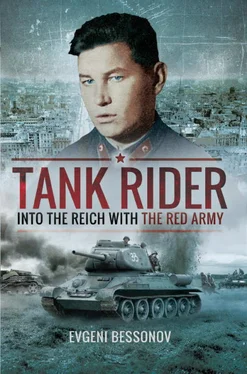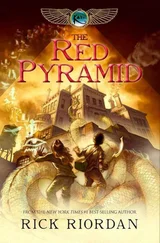The battalion met us fully armed, it turned out they mistook us for Germans. As they told me, they were about to open fire on us, but saw two tall guys – me and especially Mochalov – we called him a ‘beanpole’ because of his height. They were happy to see us, as they thought we had been killed at the road crossing.
I started my report about the battle at that road crossing and the entire situation to the battalion commander. I also reported that I had fulfilled his order to hold the road crossing till dawn. First of all I reported Captain Burkov’s wound and where they had sent him on a vehicle. The battalion’s political officer, Gerstein, and the battalion’s doctor, Senior Lieutenant Pankova, who was Burkov’s wife, immediately went to the medical platoon. They came back after some time and informed us that Captain Maxim Tarasovich Burkov had passed away. He was 25 years old. It was a big loss for the battalion. A warrior, an officer, who had been in the war from its very first day, a decent person, a brave and good comrade and commander, was dead. In my memory he will remain as a tall, physically strong and cheerful person that never lost heart. His wife, Praskovia Pankova was expecting a baby at that time, and Maxim Burkov’s son was only born after his death…
The 2nd company commander Senior Lieutenant Shtokolov, being drunk, was heavily wounded in that village. He liked to drink and he drank a lot. He was wounded because of his own stupidity. As Alexander Guschenkov told me, the drunken Shtokolov grabbed a submachine-gun and started to fire on an abandoned German APC, and the APC just exploded. Shtokolov was seriously wounded along with several others. This is how it was at the front – bravery was sometimes next to stupidity. Besides that, eyewitnesses told that in Bobzha village the ‘Slavs’ overslept the arrival of retreating German units that broke into the village at night. The battle lasted all night till dawn. The 3rd battalion of our Brigade under command of Major Alexander Grigorievich Chuyah as well as the tanks of our Brigade’s tank regiment saved the situation. The enemy forces were thrown back with heavy casualties and the situation was restored, but our losses were also high. The only conclusion is that you can sleep, but one eye has to stay open and one ear should still hear. It was war. Our battalion had been sent to another village from Bobzha and did not have losses.
We were in defence the whole day of 16 January, our task was to prevent the breakthrough of retreating German forces to the west. Everything worked out fine, however, the Germans did not appear, apparently having taken other retreat routes. On the next day, 17 January, tanks of our tank regiment caught up with us and the battalion moved forward on tanks. We continued our advance to the Oder at high speed, through Petrokov, Ostruv and Kratoshin. Along our route there were some other smaller villages and towns, which I do not remember – it’s been more than half a century since that time, during which I did not keep a diary. As usual, I was sent forward as the advanced point with my platoon on three tanks. Marching behind enemy lines is no mere parade, one had to be careful all the time. We had orders not to engage small enemy groups, not to linger – just move forward! Nevertheless, we had casualties both in men and in matériel. One gets used to heroism and self-sacrifice of men in battles, and takes it for granted, but it is impossible to get used to the death of people around you.

THE ADVANCE TO THE ODER

We advanced quickly across Poland, the enemy put up resistance only sometimes, but I did not engage the enemy – this was the job of other units, the main body of the battalion or the Brigade. It was good that the enemy’s air force was not active owing to bad weather – clouds were hanging low, it was foggy and snowed sometimes. Breaks were short, mostly to give rest to the tank drivers and for small repairs, snacks, stretching our legs and urinating. We encountered rivers sometimes. As a rule, we were able to capture bridges intact and cross the rivers. If a bridge was destroyed and the ice was strong, tanks crossed the river on it. Sometimes the ice broke under the weight of the tanks and they had to ford. There were only one or two crossings like that, not more. Some tank riders did not dismount tanks in those cases and got really wet, and there was no time to dry clothes later on. Normally the tank riders would dismount the tank and cross a river on ice not far from the tank crossing.
On the night of 18 January, 1945, having overcome enemy resistance, we rushed into Petrokov. The Brigade did not stop in the city and quickly drove through it, shooting at the houses right from tanks. Having travelled through the city, we continued our lightning march to Lodz, and at dawn on 19 January we captured the city’s southern suburb.
We dismounted and got behind some houses, in an open field, and started to dig in just in case of a German air force attack or artillery or fire strike. The enemy was silent. Some soldiers did not follow my order and only dug skirmisher’s trenches, so I had to make them dig deeper. The soldiers did not like digging in – it took a lot of energy, and sometimes it was in vain – either the enemy did not open fire or we had to leave the area right after the trenches were ready. I ordered my soldiers to dig in for many reasons: first, we would have lower losses from enemy fire, but the main thing was that soldiers could panic under strong artillery or air strike, abandon their trenches and flee in the rear, and panic always meant higher losses. Front line experience had taught me this, and I enforced it strictly. Probably this is why we had lower losses compared with other companies. I was unrelenting on these matters, as I knew it could save the lives of the soldiers and NCOs who were my subordinates. They complained and were angry with me, but I always strictly followed my rules.
In front of us we could see a nice panoramic view of Lodz and the German defences with dug-in tanks. The enemy did not open fire, nor did we fire either. The whole of 19 January was quiet. However, there was a small exchange of fire between Russian tanks. A tank column appeared to the right of us at noon. Several tanks of our tank regiment opened fire on the column. Tanks from the column returned fire. The exchange of fire lasted for a short while and suddenly stopped. It turned out that those were the tanks of the 1st Tank Army of the Belorussian front approaching the city, while we, the 4th Tank Army, were part of the first Ukrainian front. Such things tended to happen at the front, but fortunately we soon realized that these were Russian tanks and I think no one had losses.
In the suburbs of Lodz, where we dug in, I was checking how well the soldiers had dug in and walked at my full height in front of foxholes in sight of German tanks, displaying my bravado. A Partorg, a Communist party secretary of our battalion, told me that I should not walk so openly, I could be killed – he was amazed by my bravery. I remember that I answered him that a tank would not bother to fire at me, while submachine-gun fire would not reach me. After that the party secretary started to respect me, and paid attention to me for the second time after the following incident.
We were supposed to leave – as it turned out, we were not intended to capture Lodz. The tanks formed a column on the road, and the ‘mount the tanks’ order came. Our tank stood between two houses. I walked up to the tank commander and told him to move the tank a bit further forward and park behind a house, so that the enemy would not see us mounting the tank. Why should we take risks? As a response some officers from the tank regiment and our battalion criticized me. No one understood the logic of my request; all kinds of shouting, obscene curses and insults about my person were flying through the air. The tanks did not hide behind the houses, as I requested, but remained where they were. While they were cursing me, two shots sounded in the air and both shells hit the tanks that stood between the houses. After this the tanks immediately moved forward and hid behind the houses. The great officers that had cursed me walked up to those tanks and saw a horrible picture. A high-explosive shell from German Tiger tank had hit the back part of the tank, when soldiers of our company had already mounted it. The explosion killed almost everyone, some soldiers were simply blown to pieces and nothing remained of them. Some seven or eight soldiers were killed. The other tank did not have soldiers on it. The Germans did not fire any more. Colonel Turkin, the Brigade’s commander, walked up to the scene, and when he realized what had happened, he told Stolyarov and Kozienko: ‘You know, Bessonov was right.’
Читать дальше














